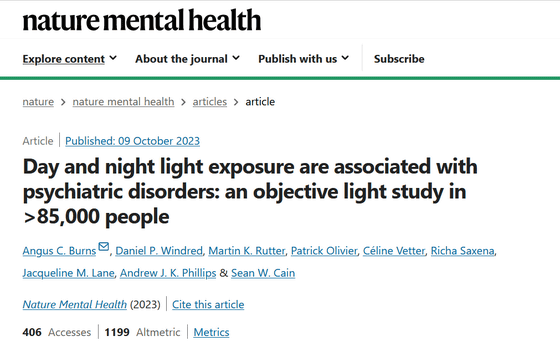Research results show that exposure to artificial light at night increases the risk of mental illness

The spread of light bulbs from the end of the 19th century to the beginning of the 20th century made it possible for humans to continue working even in the dark. However, it has been pointed out that being in a bright place at night, even though we should be sleeping, may have a negative impact on our health. Professor Sean Kane, a psychologist at Monash University, published a paper claiming that ``artificial light increases the risk of mental illness.''
Day and night light exposure are associated with psychiatric disorders: an objective light study in >85,000 people | Nature Mental Health
https://www.nature.com/articles/s44220-023-00135-8

Artificial light exposure is extremely harmful to our mental health • Earth.com
https://www.earth.com/news/artificial-light-exposure-is-extremely-harmful-to-our-mental-health/
Humans have a cycle of physiological phenomena called `` circadian rhythm .'' This circadian rhythm roughly follows a 25-hour light-dark cycle, and whether you feel sleepy or wake up naturally depends on this circadian rhythm. However, if you are exposed to more light than necessary during the night, this circadian rhythm will be disrupted.

Professor Kane said: ``Disturbance of circadian rhythm is a common feature of many mental illnesses.Light is a factor that influences circadian rhythm, and light at night disrupts circadian rhythm. 'Exposure to negative light may be an environmental risk factor for developing mental illness.'
Professor Kane analyzed the amount and duration of light exposure, sleep patterns, physical activity levels and mental health of 86,772 people registered with UK Biobank.
The results showed that exposure to artificial light at night was associated with an increased risk of developing conditions such as anxiety, bipolar disorder, PTSD, and self-harm. It has also been found that people who are exposed to a lot of light at night have a 30% increased risk of depression.

On the other hand, getting enough light during the daytime was associated with a 20% lower risk of depression and a lower risk of other mental illnesses. Professor Kane also argues that although the subjects' mental health was affected by exposure to light at night, it is important to note that there was no effect of physical activity level, season, or employment type.

Professor Kane pointed out that the human brain has evolved under conditions of exposure to light during the bright daytime and complete darkness at night. 'Compared to the natural light-dark cycle, we spend about 90% of our day indoors, with daytimes too dark and nights too bright under electric lights. This lifestyle causes confusion in our bodies. It makes them feel bad,” he said.
Related Posts:
in Science, Posted by log1i_yk







